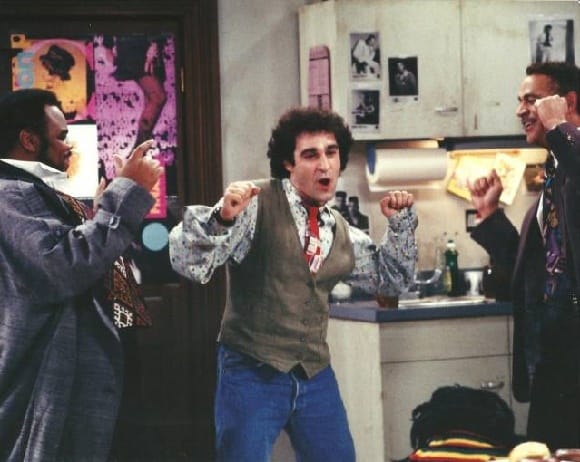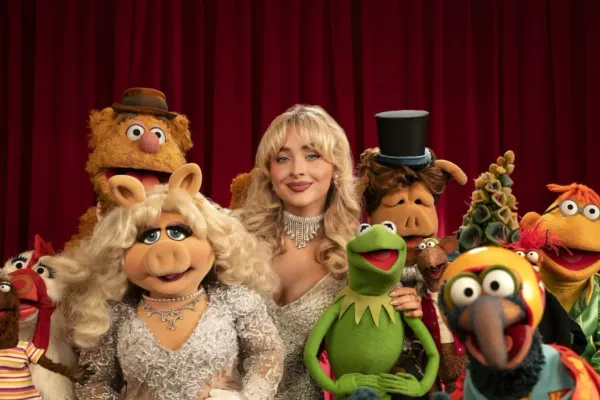Episodes: Just give me some of that Rhythm and Blues

When I was 11, there was no TV show I loved more than Mork & Mindy. It was a period in my life when my parents had just broken down and purchased a sizable satellite package. (We didn't have cable; instead, we had a large satellite dish constantly pointed toward the skies.) Thus, it was also the period in my life when I first got to know Nick at Nite and the comedic stylings of one Robin Williams.
The road that led to Robin Williams was a fairly short one. I had come to love Dave Coulier for his impressions and funny voices, and when my father grew exasperated by my constant attempts to ape the "Jackalope" from America's Funniest People (a briefly popular character from a briefly popular show), I found myself searching for others who might further my education in the impressionistic arts. Williams was a logical choice, and in Mork and Mindy, I found him at the height of his earliest, most manic power.
But where does one go from Robin Williams? I had no idea. Fortunately, NBC, at that time trying to figure out how to rebound from the end of The Cosby Show and the impending end of Cheers (though no one knew its end was imminent just yet), introduced a new program to its Thursday night lineup called Rhythm and Blues, which starred a stand-up comedian named Roger Kabler, who, Wikipedia informs me, was well-known for a Robin Williams impression. (This seems like a weird ouroboros of an impression to nail down, but there you have it.)
To look back at contemporary reviews of the show is to find a bunch of writers who were a little... let's say troubled by the racial politics of the program. Kabler played a wannabe radio DJ who had perfected a character named "Bobby Soul." He was, however, white, and the station he went to work at was an all-black station. In the pilot, he impersonated Redd Foxx and horrified seemingly half the entertainment press of the time. (You can enjoy the '90s-ness of this promo for the show right here.)
This will be the part where I point out that I was too young to realize the racial implications of what was happening or something like that, but I honestly believe that I was both too young and too isolated to understand the premise of the show. I thought it was just about a wacky guy who wanted to be a radio DJ and did lots of impressions in the meantime. I didn't grasp that it was about the one white man working at an all-black station, nor did I grasp that he was meant to be the savior of said station (and, thus, part of the awful white savior trope). Like, I'm sure that I got some of this on a very basic level, but having grown up in a tiny town where I had never met a single person who wasn't white or Native American, I'm pretty sure almost all of it sailed over my head.
(OK, I do remember that Ron Glass's character -- yes, he was in this thing -- played a former member of The Four Tops, which had been known as the Five Tops when he was in the group, but he left before they hit the big time. It was a weird plot, and an episode ended with everybody singing "I'll Be There (Reach Out)" to him.)
No, what I saw was a guy who did funny impressions (something I wanted to do with my life and/or something I tried to use to impress girls, whom I was just starting to notice), and I saw that he had some of the same zany spirit of Williams, my idol. I watched the handful of episodes to air religiously and even used to break out into the theme song at impromptu moments, my classmates staring at me in utter confusion. When the show sank without a trace and was canceled, I was certain that my new hero, Kabler, would have a long, fruitful, Robin Williams-style career. Instead, Aladdin came out a few short months later and sated my appetite for the real thing, and Kabler never had a huge acting career.
I'm not sure what prompts all of this (beyond the theme song getting stuck in my head earlier this evening), except to say that for every single show out there that seems like an easy cancellation no one will miss, there's some weird kid in South Dakota, who really loved seeing the white guy do impressions and hoped to follow in his footsteps someday. I'm willing to bet the number of people who remember Rhythm & Blues that will read this is maybe two, but for me, it's always been this reminder of a time that I really liked something, was sort of surprised to realize nobody else did, then moved on to other things once it was canceled.
Or, put another way, the TV landscape saw its first official cancellation of the 2015-16 season today with the end of Wicked City. Nobody was watching that show, and it had terrible reviews. But for someone, somewhere, it was their new favorite, regardless of all of the show's horrible subtext regarding women and for all of its clearly derivative storytelling. It's often impossible to know why people like certain things. It's always worth remembering that, perhaps especially when the cancellation bear settles in for a feast.
--
Episodes is published daily, Monday through Friday, unless I don't feel like it. It is mostly about television, except when it's not. Suggest topics for future installments via email or on Twitter. Read more of my work at Vox Dot Com.




